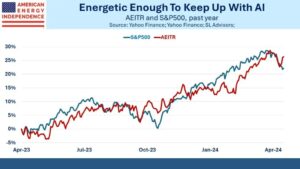Consumers just can’t get enough travel, compelling Boeing to increase the pace of producing the 737 Max aircraft. On the same day that Boeing reported its quarterly earnings and just a day after General Electric (GE) said it has increased deliveries of jet engines, the March Durable Goods report posted a big beat driven by aircraft orders. However, the core capital goods details within the report depicted weakness with business investment, which is offsetting some of the optimism from yesterday afternoon’s Big Tech earnings.
Durable goods weakness appears to be moderating investor optimism following tech earnings yesterday. With a tailwind of strong aircraft orders, the March headline Durable Goods increased 3.2% month-over-month (m/m), surpassing the 0.7% expected by a consensus of analysts and illustrating the first gain this year with January and February recording declines. On a less optimistic note, excluding transportation, orders only rose 0.3%. Core Capital Goods, which exclude defense orders and aircrafts and serves as a proxy for business investment, declined 0.4% m/m, the second consecutive month of decline just one day before first quarter GDP is reported.
Aircraft and parts notched notable m/m increases, with the nondefense sector growing orders by 78.4% while defense was up 10.4%. Computers and electronics products also contributed to gains albeit more modestly, rising 1.9% during the period. Defense capital goods, communications equipment, and motor vehicle and parts orders weighed on results, declining 0.5%, 0.2% and 0.1% respectively.
Markets are being pulled up by tech shares this morning while cyclical stocks are underperforming with weak business investment creating concerns that GDP growth may be softening. While the Nasdaq Index is up 1.15% propelled by Microsoft and Alphabet’s strong earnings, the cyclically tilted Dow Industrials Index and the Russel 2000 Index are down 0.1% and 0.2%, respectively. The S&P 500 was also down this morning before finding support at 4060. It’s now up 0.3% to 4083 with the 4100 level likely to provide some daily resistance. Bonds are relatively quiet except at the shortest end with the 1-month Treasury duration down 23 basis points (bps) while the dollar is down 0.5% as market odds are supporting the notion that the last Fed rate hike of the cycle will occur next week. Following a large price decline driven by demand concerns yesterday, WTI crude oil is relatively unchanged at $77.10.
Boeing and GE are clearly riding the wave of increasing travel, while Visa is also a beneficiary of consumers venturing beyond their home countries as illustrated by the following results:
- Boeing reported an adjusted earnings per share (EPS) loss of $1.27, considerably worse than the $0.97 EPS loss anticipated by analysts but a significant improvement from the $2.75 EPS loss in the year-ago quarter. On an encouraging note, revenues climbed to $17.92 billion, a 28% year-over-year (y/y) increase and considerably above the consensus estimate of $17.43 billion. Boeing also said it has a backlog of orders valued at $411 billion that includes more than 4,500 commercial aircraft. The company plans to increase production and deliver 38 737 aircraft per month.
- GE reported first-quarter EPS of $0.27 a share compared to the analyst expectation of $0.13. It was a 27% y/y increase. Revenues of $14.48 billion also exceeded the consensus expectation of $13.39 billion. GE’s aerospace revenues jumped 25% y/y and the company’s renewable energy and power segments experienced 92% and 91% order increases y/y. Within its aviation sector, GE said it increased its LEAP aviation engine deliveries by 53% y/y. The engines are used in the 737 Max and Airbus A320 aircraft and feature increased fuel efficiency, quieter operations and reduced emissions.
- Visa Inc.’s earnings report, furthermore, illustrates that the credit card company hasn’t been left on the sideline of surging travel demand. The company’s fiscal second-quarter ended March 31 produced a profit of $4.26 billion, or $2.03 a share, up substantially from the $3.65 billion or $1.70 a share generated in the year-ago quarter. Analysts expected EPS of $1.99. Visa generated $7.99 billion in revenue, up 11% from $7.19 billion in revenues in the same year-ago quarter and above the consensus expectation of $7.80 billion in revenues. Perhaps most significant, the company’s cross border transactions unexpectedly increased 24% y/y because of increased global travel. Overall payment volume increased 10% during the quarter and the volume of processed transactions increased 12%.
Looking beyond aviation, Microsoft and Alphabet illustrate that while consumers are tapped out on home computer purchases and companies are curtailing their advertising as the economy slows, certain bright spots still exist. The companies released the following results:
- Microsoft said its fiscal third quarter ended March 31 generated earnings of $2.45 a share and revenues of $52.9 billion, beating the analysts’ consensus of $2.22 a share and $51.0 billion in revenues. For the quarter, revenues climbed 7.1% y/y. Microsoft’s results reflect the strong trend of consumers being tapped out on home computer spending with the company’s growth occurring from business products. During the quarter, the company’s office consumer products and cloud services revenue increased only 1% and revenues for its more personal computing segment declined by 9%. Within the more personal computing segment, sales of devices declined 30%. However, revenues for the company’s commercial products and cloud services segment grew 13%, demonstrating that while Core Capital Goods Orders are weakening, companies are seeking cost savings associated with new technology, such as the cloud.
- Alphabet reported EPS of $1.17 or $15.05 billion, down from $16.43 billion in the year ago quarter. However, the EPS exceeded the $1.08 expected by analysts. Its total revenues of $69.78 billion was up 3% y/y and exceeded the Bloomberg consensus of $68.96 billion. In the most recent quarter, gains in non-advertising products, such as Android, Chrome, hardware, Google Play, cloud services and artificial intelligence helped to offset declines in advertising revenues from Google and YouTube, illustrating that businesses are curtailing their spending as the economy slows. The most recent quarter also included a $2.6 billion charge related to the company’s reduction in its workforce and office space.
With consumption strong but waning and likely driving an impressive gain in GDP, negative impacts from investment and exports may weigh on the reading and the outlook. Such a view is supporting views that the Fed is positioned to make only one more fed funds hike amidst a pricey equity market.
As markets await GDP data scheduled for tomorrow amidst conflicting information, markets seem tilted towards a less than consensus result for economic growth. With consumption strong but waning and likely driving an impressive gain in GDP, negative impacts from investment and exports may weigh on the reading and the outlook. Such a view is supporting views that the Fed is positioned to make only one more fed funds hike amidst a pricey equity market. As we look ahead, however, significant risks exist as Washington debates the debt ceiling while upcoming inflation readings could cause additional angst among investors.
Visit Traders’ Academy to Learn More about Economic Indicators.
Disclosure: Interactive Brokers
Information posted on IBKR Campus that is provided by third-parties does NOT constitute a recommendation that you should contract for the services of that third party. Third-party participants who contribute to IBKR Campus are independent of Interactive Brokers and Interactive Brokers does not make any representations or warranties concerning the services offered, their past or future performance, or the accuracy of the information provided by the third party. Past performance is no guarantee of future results.
This material is from IBKR Macroeconomics and is being posted with its permission. The views expressed in this material are solely those of the author and/or IBKR Macroeconomics and Interactive Brokers is not endorsing or recommending any investment or trading discussed in the material. This material is not and should not be construed as an offer to buy or sell any security. It should not be construed as research or investment advice or a recommendation to buy, sell or hold any security or commodity. This material does not and is not intended to take into account the particular financial conditions, investment objectives or requirements of individual customers. Before acting on this material, you should consider whether it is suitable for your particular circumstances and, as necessary, seek professional advice.
Disclosure: Futures Trading
Futures are not suitable for all investors. The amount you may lose may be greater than your initial investment. Before trading futures, please read the CFTC Risk Disclosure. A copy and additional information are available at ibkr.com.












![[Gamma] Scalping Please [Gamma] Scalping Please](https://ibkrcampus.com/wp-content/smush-webp/2024/04/tir-featured-8-700x394.jpg.webp)
![[Gamma] Scalping Please [Gamma] Scalping Please](https://ibkrcampus.com/wp-content/uploads/2024/04/tir-featured-8-700x394.jpg)














Join The Conversation
If you have a general question, it may already be covered in our FAQs. If you have an account-specific question or concern, please reach out to Client Services.